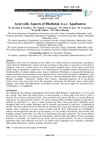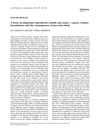 19 citations,
February 2023 in “Environmental and experimental botany”
19 citations,
February 2023 in “Environmental and experimental botany” Jasmonic acid helps plants grow, defend against threats, and survive stressful conditions like drought and salt.
Genetic analysis of rabbits identified key genes for traits like coat color, body size, and fertility.
135 citations,
December 2006 in “PLoS Medicine” Hyaluronate fragments can help reverse skin thinning by working with the CD44 receptor.
44 citations,
January 2012 in “Food and chemical toxicology” Ursolic acid can shrink the prostate and lower a hormone linked to prostate growth in rats.
 19 citations,
February 2021 in “Journal of Clinical Investigation”
19 citations,
February 2021 in “Journal of Clinical Investigation” More research is needed on the health effects of hormone therapy for transgender and nonbinary people.
 6 citations,
October 2020 in “Journal of Cellular and Molecular Medicine”
6 citations,
October 2020 in “Journal of Cellular and Molecular Medicine” 3D culture helps maintain hair growth cells better than 2D culture and identifies key genes for potential hair loss treatments.
The herbal mix effectively treats PCOS and can be sold for this use.
October 2017 in “DOAJ (DOAJ: Directory of Open Access Journals)” DA-9401 can protect against finasteride-induced reproductive damage in rats.
 August 2017 in “International journal of Ayurvedic and herbal medicine”
August 2017 in “International journal of Ayurvedic and herbal medicine” Bhallataka is a poisonous plant that, when detoxified, may have medicinal benefits for various health issues.
 5 citations,
February 2019 in “BioMed Research International”
5 citations,
February 2019 in “BioMed Research International” Acne in reproductive-age women may be linked to conditions like PCOS and lifestyle factors, so doctors should check for these when treating acne.
 286 citations,
January 2009 in “Human Reproduction Update”
286 citations,
January 2009 in “Human Reproduction Update” Women with the NIH type of PCOS have more obesity and higher risk of diabetes and heart disease than those with other types of PCOS.
 50 citations,
August 2017 in “Diabetologia”
50 citations,
August 2017 in “Diabetologia” Metformin has limited effectiveness for improving PCOS symptoms and lacks clear benefits, needing more research to confirm its efficacy.
 February 2010 in “Acta Obstetricia et Gynecologica Scandinavica”
February 2010 in “Acta Obstetricia et Gynecologica Scandinavica” The issue covers reproductive health topics like cancer markers, incontinence treatments, and the impact of pre-term birth.
 16 citations,
December 2010 in “European Journal of Obstetrics & Gynecology and Reproductive Biology”
16 citations,
December 2010 in “European Journal of Obstetrics & Gynecology and Reproductive Biology” Normal levels for certain hormones in Chinese women of reproductive age were identified.
May 2022 in “Hormones and behavior” Prairie dogs with fewer neighbors are more stressed but their number of babies isn't affected.
78 citations,
November 2014 in “Functional Ecology” Heavily hunted wolves have higher stress and reproductive hormone levels.
 69 citations,
November 2010 in “Middle East Fertility Society Journal”
69 citations,
November 2010 in “Middle East Fertility Society Journal” PCOS affects women's health by increasing the risk of diabetes, heart disease, and reproductive issues.
 21 citations,
February 2016 in “Reproductive Biomedicine Online”
21 citations,
February 2016 in “Reproductive Biomedicine Online” The conclusion suggests that PCOS may persist due to genetic traits that, while harmful for female fertility, could have provided survival and reproductive benefits to males.
 10 citations,
January 2018 in “Seminars in Reproductive Medicine”
10 citations,
January 2018 in “Seminars in Reproductive Medicine” The document concludes that women with PCOS need a comprehensive care model that covers reproductive, metabolic, and psychological health to improve their quality of life.
 1 citations,
January 2018 in “PubMed”
1 citations,
January 2018 in “PubMed” Women with PCOS have a similar chance of getting pregnant using assisted reproductive treatment as those without PCOS.
 April 2023 in “American Journal of Transplantation”
April 2023 in “American Journal of Transplantation” Hormone replacement therapy may lower the risk of severe COVID-19 outcomes in non-immunosuppressed people and male organ transplant recipients.
 2 citations,
March 2011 in “Infertility”
2 citations,
March 2011 in “Infertility” The conclusion is that lifestyle changes and weight loss are first-line treatments for infertility due to anovulation, with various medications and assisted reproductive technologies as additional options.
 70 citations,
March 2016 in “Urologic Clinics of North America”
70 citations,
March 2016 in “Urologic Clinics of North America” The document explains how the male reproductive system works, its role in making testosterone, and how conditions like obesity can disrupt it, leading to low testosterone and fertility issues.
19 citations,
June 2021 in “The world journal of men's health” Using anabolic-androgenic steroids can harm men's reproductive health and increase the risk of heart problems and death.
16 citations,
January 2014 in “Obesity surgery” Vertical sleeve gastrectomy improved metabolism, behavior, and reproduction in obese rats with PCOS.
 430 citations,
July 2002 in “Journal of Endocrinology”
430 citations,
July 2002 in “Journal of Endocrinology” The hypothesis suggests that PCOS may start early in life due to genetic and environmental factors, influencing future reproductive and metabolic problems.
 January 1989 in “Side effects of drugs annual”
January 1989 in “Side effects of drugs annual” Some cancer and immune system drugs can cause serious side effects, including heart, lung, nerve, and organ damage, which need careful monitoring and management.
 220 citations,
August 1988 in “Clinical endocrinology”
220 citations,
August 1988 in “Clinical endocrinology” Melatonin may help with sleep issues, depression, and cancer, but more research is needed.
 9 citations,
December 2013 in “International journal of gynaecology and obstetrics”
9 citations,
December 2013 in “International journal of gynaecology and obstetrics” Polycystic ovary syndrome (PCOS) is a major health issue for women in Egypt, affecting 14% of fertile women and 37.5% of infertile women.
 December 2020 in “Current Sexual Health Reports”
December 2020 in “Current Sexual Health Reports” Finasteride can have lasting negative effects on brain function and behavior by disrupting neurosteroid production.





















